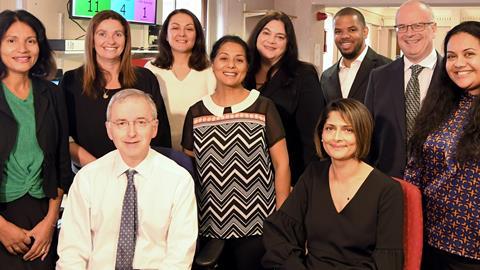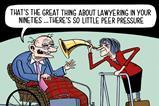As the Law Society’s Practice Advice Service turns 30, Jonathan Rayner looks behind the scenes at how the team helps hard-pressed solicitors
The Law Society’s Practice Advice Service (PAS), which in 2019 marks 30 years of providing free advice and support to solicitors, is one of the profession’s unsung heroes.
How else should you describe a service that handles more than 35,000 queries from practitioners every year, but is unknown to all but one-third of England and Wales’ 120,000-plus solicitors? Why are so many lawyers lavish in their praise of the PAS, while tens of thousands of their colleagues have never heard of it and are unaware of the help it can give?
Let us start with how the PAS operates. Its advice and support is led by a team of eight solicitors, all of whom have come to the service from careers in private practice. They know what life is like at the coal face and can understand and empathise with the problems faced by hard-pressed solicitors. Together, the team has combined post-qualification experience (PQE) of 180 years. Queries are received and answered by telephone or email.
Each team member has their own speciality, and these are periodically rotated. Sonia Aman, for example, currently leads on last year’s General Data Protection Regulation (GDPR), while Usha Aswani advises on complying with anti-money laundering rules. Other specialities include family, conveyancing, private client, regulations, civil costs and litigation, and professional indemnity insurance.
Team members are expected to research (often with the help of the Law Society’s library) the more complex queries that they receive. They also, of course, need time out from answering enquiries so that they can keep up to speed with new legislation or changes to the code of conduct. They write pieces for the PAS section of the Law Society’s website as well. These could be practice notes or question-and-answer (Q&A) briefings. There is a comprehensive A-Z of Q&As on the website.
How effective is the advice they give? The Gazette spoke to Oliver Nelms, a private client lawyer at West Sussex firm Colemans. He explains: ‘We’d been instructed on a matter that had been ongoing for almost a decade. The parents had died and we were struggling to contact either of the two beneficiaries. One of them lives in the US and the other much closer to home. We were holding money and needed instructions.
‘So I called the PAS to ask the best way forward. They gave me a plan that set the scene nicely and told me what other things I should do. They also directed me towards the appropriate practice note. It was good to chat and have a sounding-board. I wasn’t aware of the PAS until I was doing my training contract. As a profession, we’re incredibly lucky to have it.’
PICK UP THE PHONE TODAY
‘Providing free helplines is one of the many ways the Society supports its members,’ states practice advice manager Andrew Bigby. ‘These have expanded over the years to include dedicated helplines for anti-money laundering (AML), complaints-handling and pastoral care.’
- AML Helpline Call 020 7320 9544 for advice on AML and for help in navigating the AML guidance for the legal sector.
- Lawyerline Call 020 7320 5720 for advice on client care and complaints-handling.
- Pastoral Care Call 020 7320 5795 for confidential advice on personal or professional difficulties.
Private client partner Sophie Davies at Dorset firm Farnfields is another satisfied customer. In June this year, she wrote to the PAS’s current family law specialist Priti Solanki to say: ‘I would just like to thank you for your time and assistance. It was extremely helpful to chat my matter through with you and obtain some confirmations and reassurance.
‘I wanted to thank you personally and the Law Society for providing such a service, which is invaluable in the industry given the stresses and strains.’
The Gazette next turns its attention to the other side of the equation: the PAS team members who deliver the advice and support. Peter Irvine is first up. He has been with PAS for six years and is presently leading on conveyancing. He is asked what type of lawyer most commonly calls him. ‘Junior solicitors from all sizes of firm,’ Irvine replies. ‘They are often reluctant to seek help from a colleague because they fear that showing ignorance could harm their careers. Other callers might be sole practitioners or solicitors in small firms. In both instances, the callers feel isolated and that they have nobody to turn to. We can fill the gap. Anybody could call, which is one of the joys of this job – the unexpected every time.’
What are callers most worried about? ‘The SRA,’ he replies. ‘There are the new, slimmed-down SRA codes of conduct for firms and practitioners, for instance. People are wary about the devil in the detail, which could spring surprises. They are awaiting guidance. Then there are queries about setting up in practice. The SRA says you must have adequate insurance, for instance, but hasn’t defined ‘adequate’. How much do we require?, callers want to know.
‘And then there is the new breed of freelance solicitors. There are fears that mistakes will be made and that the public will be confused and less protected. On the credit side, of course, freelance solicitors will be meeting an unmet need. They will also be welcomed, in particular, by younger solicitors who want to turn their backs on the old partnership model for law firms and be self-employed. Everyone’s life is to be made more complex, and yet the SRA guidance is not out there yet.’
What are the most unusual pleas for help that Irvine has received during the last six years? ‘There was the solicitor in a criminal practice who complained that the senior partner, who lived a lavish lifestyle, refused to employ a cleaner. The complainant suffered from asthma and said the dust exacerbated her health problems.’
Another potential health problem was a complaint from two trainees that they were obliged to work in an unheated attic. Irvine repeats: ‘The unexpected, every time.’
MULTI-PARTY ACTION SERVICE
The PAS operates a multi-party action service. Also known as group actions or group litigation, multi-party actions can arise when a significant number of claimants have closely related or similar claims arising from the same event.
These usually fall into three main categories:
- Sudden disasters which result in personal injury or fatal accident claims
- Ongoing claims which arise from a single cause – for example, from a defective drug or product
- Claims involving the consumer. These include personal injury; financial loss, such as mis-sold endowment policies and payment protection insurance; and defective goods or services.
If your firm is already participating in (or contemplating participation in) such an action, contact the PAS so that your details may be recorded and you can receive advice (020 7320 5675)
Georgia Costa is the newest recruit to the PAS, having been on the team for six months. She has 21 years of PQE as a conveyancer, although she currently leads on new standards and regulations. She confesses: ‘Despite all those years in private practice, I didn’t know that the PAS existed. I also worked under the misguided belief that the SRA and Law Society were one and the same institution. The problem is, in private practice you are so focused on the file in hand that you don’t have time to see the big picture. The PAS gives you the opportunity to research topics and keep abreast of developments. That’s a great gift compared with the pressures of private practice.’
Why the move? ‘Conveyancing files were growing ever thicker and trained solicitors, such as myself, were rapidly being replaced by conveyancing factories using less expensive paralegals.’ What are the commonest types of call she receives? ‘It’s often poor conveyancers sitting at their desks in a panic because the client account, which with property transactions often holds a great deal of client money, has been hacked. We are their lifeline and can tell them how to protect their firm. Has money been lost? Client data compromised? If so, inform the police, Information Commissioner and clients. You can hear the relief in their voices when they realise you’ve given them a route out.
‘But the very commonest are queries about the Conveyancing Quality Scheme and, in particular, the Law Society’s Conveyancing Protocol.’
The protocol, according to the Society’s website, has been designed as the framework for the sale and purchase of a home for an owner-occupier. Its 35 steps are not exhaustive and, practitioners are warned, should not be regarded as a conveyancing checklist. They are simply intended to ensure that all clients are treated fairly and are protected when dealing with high-value assets and liabilities. ‘Conveyancers, particularly younger, less experienced ones, go in fear of getting the protocol wrong and having the regulator swoop down upon them.’
GDPR lead Aman describes how she helps callers grapple with the complexities of subject access requests (SARs). (These are not to be confused with suspicious activity reports – also known as SARs – which are the domain of anti-money laundering investigators.) A GDPR SAR is the right of access allowing an individual to obtain records of their personal information held by an organisation.
Callers have enquired whether a SAR supersedes the solicitor’s right to exercise a lien over a client’s file. Another discloses that her firm has received three SARs within the space of a week. She asks: ‘Is it possible to request an extension to the usual one-month time limit set by the GDPR to provide all the information requested?’
Aman is able to reassure the caller: ‘If the SAR is complex or the same client makes multiple SARs, the response time may be extended to three calendar months, starting from the day after receipt. However, the firm’s data controller must inform the client of the extension and the reason for the delay within the one-month time limit.’
Solanki has been in post for 19 of the PAS’s 30 years. She comments on changes in its role and the enquiries it receives: ‘I’ve noticed how the challenges our members face have become more onerous and complex over the years and how this is impacting on mental health in the profession.
‘One of the most rewarding aspects of the job is being there for our members and supporting them holistically, on a professional and personal level.’

































1 Reader's comment